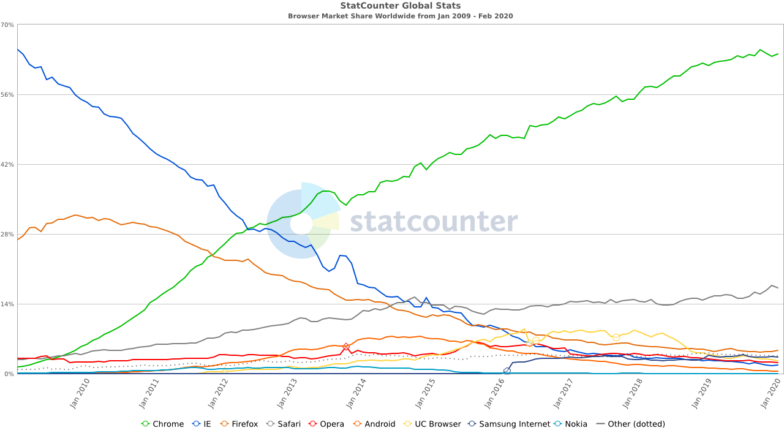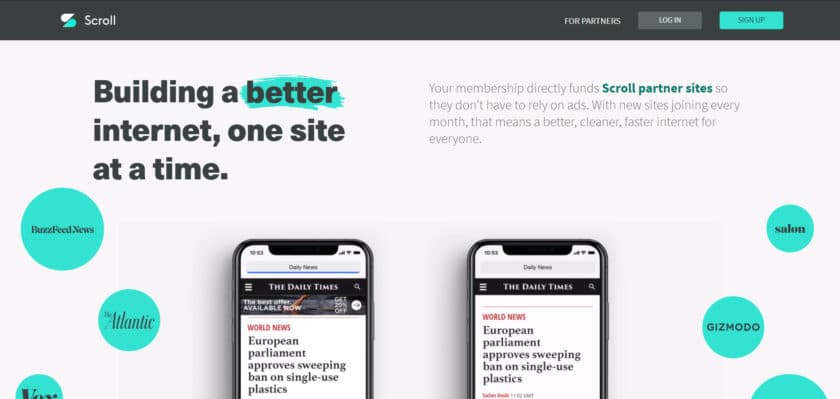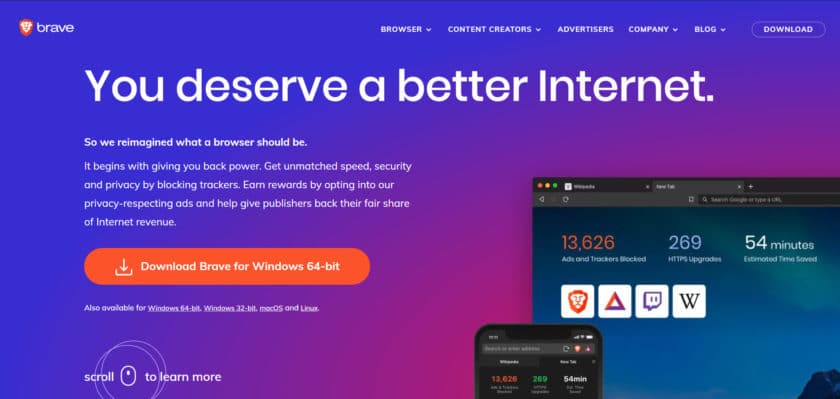Farewell to the cookie era. Welcome to the age of browsers in digital advertising!
Put this way it may sound a bit dramatic but I will try to explain my point of view better. Before I begin, let me recap on the concept of cookies so that everyone can better understand.
Index
What are cookies?
Cookies are small files created by websites you visit and stored in your browser. They make your online experience easier (but less private) by saving you browsing information. With cookies, sites can keep you logged in, remember your site preferences, and provide you with relevant content.
There are two types of cookies:
- Primary cookies: created by the site you access, the one that is displayed in the address bar.
- Third-party cookies: created by other sites. These sites have some of the content, such as ads or images, that you see on the web page you access.
Browsers will discontinue the use of third-party cookies
What does this mean for your user’s privacy and for your company?
The digital advertising universe as we know it today relies heavily on the use of third-party cookies. Most behavioral analysis and advertising tools rely on cookies and will now need to find alternatives for data collection.
It is important to understand why browsers are limiting cookies and the legal limitations placed on them.
Why do browsers limit cookies?
If you are interested in understanding a little more about the history of navigators, Simo Ahava gave an excellent presentation at Superweek 2020.
Technological tools and resources (including browsers) need to update faster and faster. The market (users and laws) is also asking for more privacy.
In 2019 we had more privacy improvements in browsers than in the previous 5 years. Not to mention the rise of new browsers that promise (and deliver) more privacy.
The major browsers (Chrome, Safari, and Firefox) are aware of the need to protect their users against the use of third-party cookies, used to create profiles and purchase interests.
Features such as ITP (Intelligent Tracking Prevention) are designed to protect the user’s privacy by preventing cross-site tracking.
The goal is for sites to create a closer relationship with their own users (in the context of a single site for ITP and in the context of an organization for Chrome) and to prevent third parties from providing this.
Read also: SEO for copywriters – the “complete copywriter” figure
Data Protection Laws
The law that “paved the way” for the other data protection laws was the European GDPR. It is also the strictest in the world so far. The California Consumer Privacy Act ( CCPA ) went into effect in January 2020. The Brazilian LGPD (Lei Geral de Proteção de Dados Pessoais) will come into force in August 2020.
Several local laws (especially in Europe) support the use of specific cookies to satisfy certain interests, such as analyzing browsing data. In short, they argue that consent is not required for the use of cookies if the purpose is to obtain only statistics of that data. However, you cannot use them to draw any conclusions about the user’s private life (data must be anonymous).
I share the opinion of some market colleagues:
No consent, no tracking.
This phrase was adopted in the Digital Marketing & Analytics Ethics Manifesto drafted by over 30 professionals (including me) in the analytics field and presented by Stéphane Hamel at Superweek 2020.
Both browsers and privacy laws seek the same thing. Their main purpose is not to prevent you from analyzing users (on your site) or running tests to improve and optimize the user experience. They are here to prevent the creation of identities on third party systems outside the context of the site, without the active consent of the user.
Read also: Let’s ban targeted advertising!
The Future of Browsers
The three most used browsers in the world at the moment are Chrome, Safari and Firefox, but more privacy-conscious alternatives such as Brave are growing fast. Chrome is the most used (64% of devices worldwide and 84% in Brazil), followed by Safari with 18% and Firefox with about 5%.

What these players do is key to understanding how the market will behave and what you should know to design your online marketing strategy.
Also read: What are pageviews in Google Analytics?
Google Chrome
Chrome is the market leader and also the controversial one, since its main revenue comes from Google’s advertising products. Things change and we’ve seen other browsers fall by the wayside for not offering features that users demanded…

Google is aware of the competitive pressure from these and new players and is running after alternatives to ensure the privacy of its users. Among these technologies are Samesite, Privacy Sandbox, and the Conversion Measurement API.
Apple Safari
Safari is perhaps the browser that has drawn the most attention to user privacy in recent years. In 2019 it released ITP 2.1, ITP 2.2 and ITP 2.3 and has been working heavily on other features such as LoggedIn, Private Click Measurement and Storage Access API.
Mozilla Firefox
It offers privacy protection for third-party cookies using Enhanced Tracking Protection (ETP).
ETP blocks all third-party cookies, if they are on this list. First-party cookies are not blocked. Mozilla’s priority seems to be the refinement, categorization and expansion of the cookie list.
Are cookies having their days counted?
Not completely. Most articles online talk about the death of cookies. Although there are many APIs that can take over some of the work of cookies, there is no sign that cookies will be permanently extinct. Third-party cookies will disappear completely, which is good for users’ privacy.
Justin Schuh, Chrome’s director of engineering recently stated:
… we plan to phase out support for third-party cookies in Chrome. Our intention is to do this within two years.
The post-cookie world
Many in the technology, marketing, and advertising industries are not prepared for these changes. It will be increasingly difficult to survive the post-cookie world. Data activation is more difficult without them.
In the world of digital advertising and marketing, audience segmentation and performance attribution are a must for optimizing campaign performance. Any company that does not have access to the data (first party) will be at a disadvantage. Those who manage to strengthen the relationship with their users will have a great competitive advantage.
Facebook itself is being squeezed between regulations and governance policy. Outside of your boundaries, it is increasingly difficult to leverage your valuable user data to add value. The departure of FAN (Facebook Audience Network) from the web is a clear indication that Facebook knows this. Are they developing a unique authentication feature, seeking to slow others down in replacing cookies with browser-level logins? Or maybe thinking about buying a browser?
The evident market interest in optimizing user consent or presenting some benefit at the login stage (like Amazon’s “1-Click”) makes it clear that the battle will be over logins and accounts.
Alternative forms of digital advertising
In the face of all the pressures and regulations some (interesting) solutions emerge on the market. Here are a few:
Scroll
Scroll is a system where the user pays a monthly fee in exchange for “a better internet” (no banners). It is an alternative to conventional advertising that brings a better return for publishers and a more fluid navigation for the user.
Brave Browser
Brave is worth a try. Recently a study showed that Brave is the best browser today when it comes to privacy.
But this is not the only feature that calls attention to Brave. It also offers a reward program that pays the user for his or her attention. Brave Rewards is based on BAT (Basic Attention Token), a new way of valuing attention by connecting users, content creators and advertisers.
Google itself is talking to some publishers about paying a fee for content that would be part of a news product. This initiative can be seen from different angles:
- Would it be a way to temporarily compensate for the extinction of third-party cookies?
- Would it be simple and direct payment for producing content for your news service?
- Or is it a way to compensate for the losses in CTR of organic searches due to direct results that are displayed in the search engine?
Conclusion
The cookies are disappearing. Laws and users are pushing for transparency and forcing everyone to provide mechanisms that allow users to control how their data is used.
Digital activities will possibly be linked to user accounts.
Websites should create a closer and more transparent relationship with their users.
Prepare your team to plan and adopt adequate strategies for the new scenario. He may be closer than you think.


